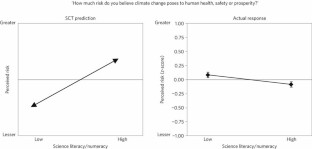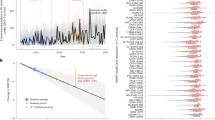Abstract
Seeming public apathy over climate change is often attributed to a deficit in comprehension. The public knows too little science, it is claimed, to understand the evidence or avoid being misled1. Widespread limits on technical reasoning aggravate the problem by forcing citizens to use unreliable cognitive heuristics to assess risk2. We conducted a study to test this account and found no support for it. Members of the public with the highest degrees of science literacy and technical reasoning capacity were not the most concerned about climate change. Rather, they were the ones among whom cultural polarization was greatest. This result suggests that public divisions over climate change stem not from the public’s incomprehension of science but from a distinctive conflict of interest: between the personal interest individuals have in forming beliefs in line with those held by others with whom they share close ties and the collective one they all share in making use of the best available science to promote common welfare.
This is a preview of subscription content, access via your institution
Access options
Subscribe to this journal
Receive 12 print issues and online access
$209.00 per year
only $17.42 per issue
Buy this article
- Purchase on Springer Link
- Instant access to full article PDF
Prices may be subject to local taxes which are calculated during checkout


Similar content being viewed by others
References
Pidgeon, N. & Fischhoff, B. The role of social and decision sciences in communicating uncertain climate risks. Nature Clim. Change 1, 35–41 (2011).
Sunstein, C. R. On the divergent American reactions to terrorism and climate change. Columbia L. Rev. 107, 503–557 (2007).
Weber, E. U. & Stern, P. C. Public understanding of climate change in the United States. Am. Psychol. 66, 315–328 (2011).
Douglas, M. & Wildavsky, A. B. Risk and Culture: An Essay on the Selection of Technical and Environmental Dangers (Univ. California Press, 1982).
Kahan, D. M., Braman, D., Slovic, P., Gastil, J. & Cohen, G. Cultural cognition of the risks and benefits of nanotechnology. Nature Nanotech. 4, 87–91 (2009).
Kahan, D. M., Jenkins-Smith, H. & Braman, D. Cultural cognition of scientific consensus. J. Risk Res. 14, 147–174 (2011).
Pearl, J. Causality: Models, Reasoning, and Inference (Cambridge Univ. Press, 2009).
Dohmen, T., Falk, A., Huffman, D., Sunde, U., Schupp, J. & Wagner, G. G. Individual risk attitudes: Measurement, determinants, and behavioral consequences. J. Eur. Econ. Assoc. 9, 522–550 (2011).
Ganzach, Y., Ellis, S., Pazy, A. & Ricci-Siag, T. On the perception and operationalization of risk perception. Judgment Decis. Making 3, 317–324 (2008).
Kahneman, D. Maps of bounded rationality: Psychology for behavioral economics. Am. Econ. Rev. 93, 1449–1475 (2003).
Peters, E., Västfjäll, D., Slovic, P., Mertz, C. K., Mazzocco, K. & Dickert, S. Numeracy and decision making. Psychol. Sci. 17, 407–413 (2006).
Liberali, J. M., Reyna, V. F., Furlan, S., Stein, L. M. & Pardo, S. T. Individual differences in numeracy and cognitive reflection, with implications for biases and fallacies in probability judgment. J. Behav. Decis. Makinghttp://dx.doi.org/10.1002/bdm.752 (2011).
McCright, A. M. & Dunlap, R. E. Cool dudes: The denial of climate change among conservative white males in the United States. Glob. Environ. Change 21, 1163–1172 (2011).
Krosnick, J. A., Holbrook, A. L. & Visser, P. S. The impact of the fall 1997 debate about global warming on American public opinion. Public Underst. Sci. 9, 239–260 (2000).
Sunstein, C. R. Misfearing: A reply. Harv. L. Rev. 119, 1110–1125 (2006).
Kellstedt, P. M., Zahran, S. & Vedlitz, A. Personal efficacy, the information environment, and attitudes toward global warming and climate change in the United States. Risk Anal. 28, 113–126 (2008).
Slovic, P. Trust, emotion, sex, politics, and science: Surveying the risk-assessment battlefield. Risk Anal. 19, 689–701 (1999).
Cohen, G. L. Party over policy: The dominating impact of group influence on political beliefs. J. Pers. Soc. Psychol. 85, 808–822 (2003).
Downs, A. An Economic Theory of Democracy (Harper, 1957).
Chen, S., Duckworth, K. & Chaiken, S Motivated heuristic and systematic processing. Psychol. Inq. 10, 44–49 (1999).
Giner-Sorolla, R. & Chaiken, S. Selective use of heuristic and systematic processing under defense motivation. Pers. Soc. Psychol. Bull. 23, 84–97 (1997).
Kahan, D. Fixing the communications failure. Nature 463, 296–297 (2010).
Mercier, H. & Sperber, D. Why do humans reason? Arguments for an argumentative theory. Behav. Brain Sci. 34, 57–74 (2011).
Hardin, G. The tragedy of the commons. Science 162, 1243–1248 (1968).
Nisbet, M. C. in Communicating Science: New Agendas in Communication 41–67 (Routledge, 2010).
National Science Board Science and Engineering Indicators, 2010 (National Science Foundation, 2010).
Allum, N., Sturgis, P., Tabourazi, D. & Brunton-Smith, I. Science knowledge and attitudes across cultures: A meta-analysis. Public Underst. Sci. 17, 35–54 (2008).
Weller, J., Dieckmann, N. F., Tusler, M., Mertz, C. K., Burns, W. & Peters, E. Development and testing of an abbreviated numeracy scale: A rasch analysis approach J. Behav. Decis. Making http://dx.doi.org/10.1002/bdm.1751 (2012).
Frederick, S. Cognitive reflection and decision making. J. Econ. Perspectives 19, 25–42 (2005).
Berry, W. D. & Feldman, S. Multiple Regression in Practice 48 (Sage University Papers Series, Quantitative Applications in the Social Sciences no. 07-050, Sage Publications, 1985).
Acknowledgements
Research for this paper was financially supported by the National Science Foundation, Grant SES 0922714.
Author information
Authors and Affiliations
Contributions
D.M.K., E.P., M.W. and L.L.O. contributed to all aspects of the paper, including study design, statistical analysis and writing and revisions. P.S., D.B. and G.M. contributed to the design of the study, to substantive analysis of the results and to revisions of the paper.
Corresponding author
Ethics declarations
Competing interests
The authors declare no competing financial interests.
Supplementary information
Rights and permissions
About this article
Cite this article
Kahan, D., Peters, E., Wittlin, M. et al. The polarizing impact of science literacy and numeracy on perceived climate change risks. Nature Clim Change 2, 732–735 (2012). https://doi.org/10.1038/nclimate1547
Received:
Accepted:
Published:
Issue Date:
DOI: https://doi.org/10.1038/nclimate1547
This article is cited by
-
Motivated reasoning about climate change and the influence of Numeracy, Need for Cognition, and the Dark Factor of Personality
Scientific Reports (2024)
-
Correlations Among High School Students' Beliefs about Conspiracy, Authoritarianism, and Scientific Literacy
Science & Education (2024)
-
Scientific reasoning is associated with rejection of unfounded health beliefs and adherence to evidence-based regulations during the Covid-19 pandemic
Current Psychology (2024)
-
Comparative analysis of Australian climate change and COVID-19 vaccine audience segments shows climate skeptics can be vaccine enthusiasts
Scientific Reports (2023)
-
Participating in a climate prediction market increases concern about global warming
Nature Climate Change (2023)



